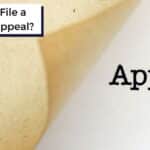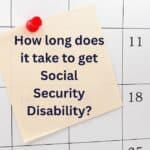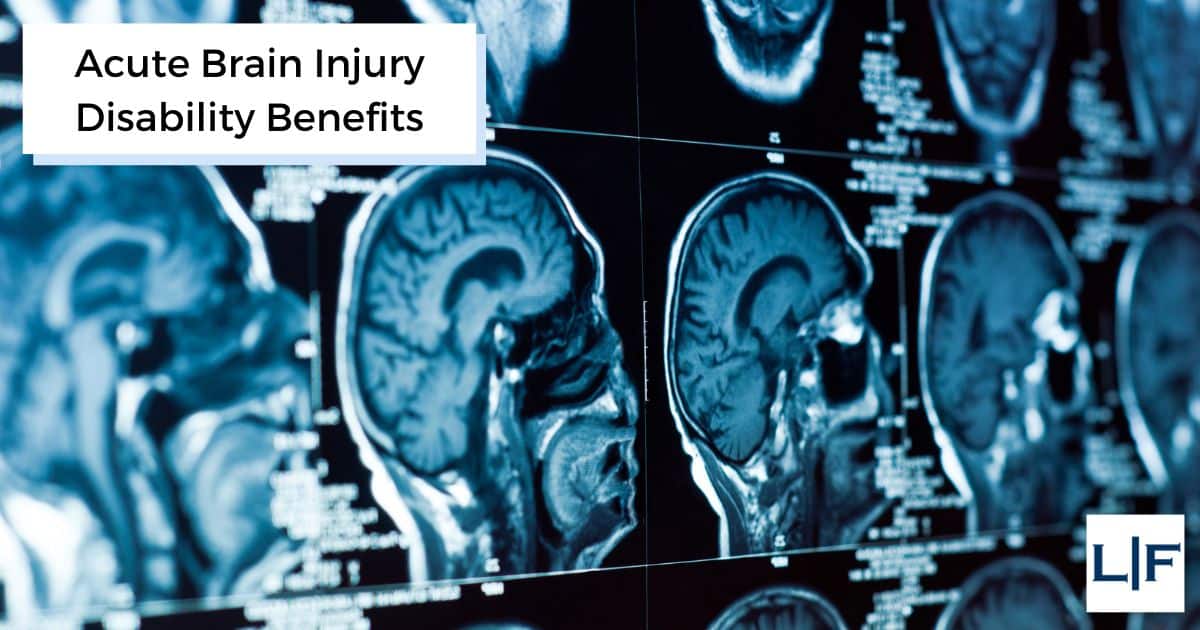Acute brain syndrome (ABS), a type of organic brain syndrome, can cause severe mental and behavioral problems and cognitive deficits. ABS may result from a traumatic brain injury, infection, overdose, or other physical ailment or disorder. The condition, which may be temporary or permanent, can cause symptoms that completely disrupt a person’s life and make holding a job impossible.
If you or your loved one has developed ABS, Social Security disability benefits may be available. To see if you are able to recover Social Security disability for acute brain syndrome, contact Lunn and Forro, PLLC for a free case evaluation: 888-966-6566.
What are the basic requirements for Social Security disability benefits?
There are several basic requirements you must meet in order to win disability benefits:
- You must have a condition that either meets the severity criteria under a listing (more on that in the next section) or prevents you from engaging in “substantial gainful activity.”
- Your condition must have lasted, or a doctor must expect it to, last a year or longer or result in death.
- You must meet certain financial or work history requirements, depending on which disability program you are applying for. Disabled workers applying for Social Security Disability Insurance (SSDI) must have earned sufficient work credits; blind persons, disabled children, and disabled adults with little to no work history who are applying for Supplemental Security Income (SSI) must prove that their income and assets fall below a certain threshold.
Can I collect disability benefits for acute brain syndrome?
If you meet the criteria under one of the listings in the Social Security Administration’s (SSA) Blue Book, it will consider you disabled. Many people with ABS qualify as disabled under Listing 12.02, Neurocognitive Disorders.
This listing includes a spectrum of disorders that involve psychological or behavioral abnormalities, dysfunction of the brain, and a specific organic factor that causes an abnormal mental state and loss of previously acquired functional abilities.
In order to qualify under this listing, you must satisfy section 1 and either section 2 or 3:
1) You must have medical evidence of a “significant cognitive decline from a prior level of functioning” in one of the following areas:
- Social cognition
- Perceptual-motor
- Memory and learning
- Language
- Executive function
- Complex attention
2) Your symptoms must at result in an “extreme limitation of one, or marked limitation of two” of the following: understanding, remembering, or applying information; social functioning; concentrating, persisting, or maintaining pace; adapting or managing oneself.
3) In addition to proving that your condition has lasted at least two years, you must provide evidence of both of the following:
- Medical or mental health treatment, support, or a “highly structured setting” that reduces your signs or symptoms
- Minimal capacity to adapt to environmental changes or demands that are not a part of your daily life
If your ABS resulted from a traumatic brain injury, substance abuse, cancer, or another condition, you may be able to qualify under those respective listings instead.
What if my mental disorder does not meet a listing?
If your ABS does not meet the requirements under any listing in the Blue Book, you may still qualify for benefits with a medical vocational allowance. The claims examiner will look at your medical and mental health records and assess what types of limitations you have. S/he will look at things such as your ability to concentrate for long periods of time, your ability to understand and follow instructions, and your ability to communicate and work well with coworkers.
If the SSA finds that given your limitations, age, work history, and education, there are no jobs you can do, it will award you with a medical-vocational allowance.
What types of documentation do I need to give the SSA?
In order to prove your disability to the SSA, you will need to submit sufficient medical evidence that demonstrates your ABS and the limitations it causes. The SSA will want to see all of your medical and psychiatric files related to your condition, including:
- Medical tests such as blood work, MRIs, and CT scans
- Psychological evaluations and profiles
- Clinical diagnoses
- Physicians’ notes about your signs and symptoms
- Detailed descriptions of your limitations
- Treatments you have undergone and how you reacted to them
- Other records to satisfy the requirements of a listing, such as IQ tests and memory tests
You can also submit non-medical evidence such as personal testimonies to the SSA for consideration. For example, you can have your spouse, employer, family members, friends, counselor, religious leader, etc. write down their account of how your brain disorder is affecting your ability to function and work. The SSA will take all the evidence you send them into account when it reviews your case.
The more supportive evidence you collect, the better. Note, it is not easy to get approved for disability benefits. The SSA is very strict and denies many of the claims it receives each year. To improve your chances of winning your benefits, have a disability lawyer help you with your claim. We can help you navigate all aspects of the complex claims process.
What do I do if the SSA denied my application for disability for ABS?
If the SSA notified you that it denied your application for disability benefits, call Lunn and Forro, PLLC to discuss filing an appeal. You have every right to request that the SSA reconsider its decision if you do not agree with it.
There could be various reasons for an unfair denial. You might not have submitted sufficient medical records, or your condition might not have been detrimental enough when you applied. Whatever the reason, we can help you appeal a wrongful denial and present additional evidence to the SSA for review. We will attend any hearings with you, talk to medical experts, and protect your rights during the process.
Call a Social Security disability lawyer in Raleigh at Lunn and Forro, PLLC today to discuss your ABS disability claim: 888-966-6566. Let us help you pursue the benefits you need.
Related Posts

What is a consultative exam?
A consultative exam is ordered when Social Security believes that they need more medical information to make a decision in your case. This exam is

How Do I File a Disability Appeal?
You gave Social Security Disability all the information they asked for and agreed to a medical exam, but your disability claim was still denied. It

How Much Does a Disability Lawyer Cost?
Lawyer fees in Social Security cases are contingent. So the short answer is that it costs you nothing up front to hire a lawyer at

How Long Does It Take to Get Social Security Disability?
“How long does it take to get Social Security Disability benefits?” is probably the most common question that our clients ask. Every case is different,
Do I Need a Disability Lawyer to get SSDI?
Many people wonder if they really need the help of a disability lawyer to obtain their Social Security benefits. You May Not Need a Disability
Notice of Hearing – Social Security Disability
The wait for a disability hearing varies from a few months to over a year, and once the Request for Hearing is filed, you will
I fired my disability lawyer. Now I need a fee waiver. What do I do?
Whenever a disability lawyer withdraws from a case, either on their own or at their client’s request, they must decide whether or not to waive
The Role of a Social Security Disability Attorney
When people are faced with applying for Social Security disability benefits, many wonder if it is worthwhile to hire an attorney. After a life-altering disability



